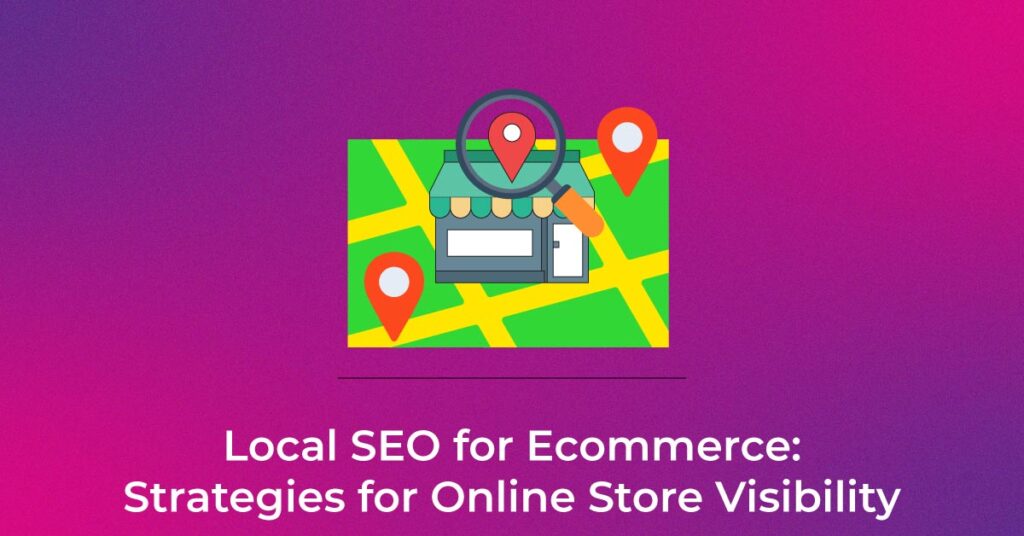Understanding Local SEO for E-commerce
What is Local SEO for E-commerce?
Local SEO for e-commerce is a tailored approach that aligns your online store with the geographical needs of your clientele. Think of it as bridging the digital with the local—allowing your ecommerce site to resonate with shoppers just around the corner. It’s all about optimizing for local search engine results by implementing key tactics, such as localizing content, tweaking technical SEO aspects, and managing your online reputation to target potential customers in your area specifically.
Why Local SEO Matters for Ecommerce Stores
Local SEO is a game-changer for e-commerce stores, and here’s why: when shoppers are on the lookout for products or services, their searches are often location-based. By honing in on local SEO, you place your eCommerce store and its offerings in front of potential customers who are searching nearby, especially when integrated with an eCommerce platform for SEO that optimizes local visibility. This approach increases the likelihood of in-store visits and online purchases from customers nearby. It’s not just about visibility; it’s about being conveniently accessible to your community, building a loyal customer base, and outshining local competitors who may not have caught onto the local SEO wave. Plus, with the surge in mobile searches, local SEO ensures your store pops up for those on-the-go shoppers eager to find immediate solutions in their vicinity.
Key Benefits of Local SEO for E-commerce
Increased Local Traffic and Foot Traffic
When your online store harnesses the power of local SEO, you’re essentially placing a digital “We’re Open” sign that’s visible to anyone searching nearby. This visibility increases local traffic to your website, as nearby customers find your store’s link a hop, skip, and jump away on their search engine results page. Moreover, if you offer in-store pickups or have a physical presence, local SEO can translate to more foot traffic as well. It’s like laying down a welcome mat to your local audience, inviting them to step right into your online or brick-and-mortar store.
Higher Conversion Rates Through Targeted Reach
Focusing on local SEO doesn’t just drive any kind of traffic—it connects you to customers who are much more likely to convert. By targeting users based on their location, your e-commerce store can cater to an audience with immediate interest and intent. This specificity means that your marketing efforts aren’t just casting a wide, indiscriminate net, but rather tossing a precise line right where the fish are biting. This way, your store enjoys higher conversion rates because local searchers often have their wallets ready, seeking a quick solution to their needs.
Competitive Advantage Over Local Competitors
Taking control of local SEO can significantly boost your eCommerce store’s visibility and competitiveness. While some businesses may be slowly entering the online marketing space, you have the opportunity to fully commit and establish a strong local online presence. By optimizing for local searches, you can effectively compete with nearby businesses and potentially outrank regional competitors, including larger brands, in local search results. This competitive advantage is crucial in a market where visibility can determine whether a business thrives or struggles.
Long-Term Business Growth
Local SEO is no quick fix; it’s an investment in the sustainable growth of your e-commerce business. By building a strong local online presence, you establish trust and authority in your community, and that reputation endures. Over time, this groundwork transforms into a virtuous cycle of increased sales, customer retention, and positive word-of-mouth—all of which can contribute to a robust bottom line. Unlike one-off advertising, local SEO continues to pay dividends well into the future, making it an integral strategy for long-term business success.
Steps to Implement Local SEO for Your E-commerce Store
Conducting Local Keyword Research
Conducting local keyword research is like discovering the treasure map of your ecommerce store’s online presence. Start by brainstorming a mix of keywords that mirror your brand’s offerings. Next, spice up these terms with a dash of local flavor—think city names, neighborhoods, and landmarks that anchor your business in the community. There’s a plethora of tools, like Google Keyword Planner and Ahrefs, at your disposal to refine this mix, providing insights into search volume, competition, and the searcher’s intent.
Remember, wearing your local customer’s shoes can make all the difference. Insert long-tail keywords, like “buy organic coffee beans in Seattle,” into your lexicon. They might be less traffic, but they’re loaded with high purchase intent, boosting the chance of drawing in the exact audience you’re targeting. Once you’ve got a goldmine of localized keywords, sprinkle them across your website—product descriptions, titles, blog posts, meta descriptions—to climb the ranks in local search results.
Optimize your Google My Business Profile for E-commerce
Optimizing your Google My Business Profile (GMB) for ecommerce is like setting up a flashy billboard right in the digital main square. First things first, claim your turf on the Google Business Profile website by searching for your business name. If it’s missing, stake your claim by providing accurate and detailed business information. Make sure your profile is chock-full of goodness—crisp images that showcase your products, a clear-cut business description, precise location, operating hours, and an up-to-date phone number and website link.
Choosing the right business category is crucial; it’s how Google deciphers who should see your listing. But the cherry on top? Customer reviews. They’re like a friend’s recommendation—priceless. Encourage happy customers to tip their digital hats to you with a glowing review and remember to respond gracefully. Every thank you or thoughtful reply can inch your local SEO ranking higher, successfully positioning your ecommerce store in the spotlight for local searches.
Building Local Citations and Directory Listings
Building local citations and directory listings is a fundamental strategy for amplifying your ecommerce site’s local discovery, alongside off-page SEO for ecommerce. These citations, which are mentions of your business name, address, and phone number (NAP), should be scattered like seeds in fruitful soil—local directories like Yelp, Yellow Pages, and the local chamber of commerce sites are the perfect breeding grounds. Consistency is key; ensure your NAP info is identical everywhere, as discrepancies could confuse both potential customers and search engines.
Don’t limit your efforts to popular directories; niche-specific ones are also valuable and can enhance the relevance of your listings. This approach not only improves your SEO but also allows you to reach a more targeted audience. By establishing a network of citations, you’re building your store’s online reputation, strengthening it against competitors, and increasing visibility in your local market.
Gathering and Managing Customer Reviews
Gathering and managing customer reviews can be likened to tending a garden—it requires attention and care, yet it can yield a bounty of trust and credibility. Reviews are the lifeblood of local social proof, swaying potential customers more effectively than any advertisement could. Strategize to generate these golden nuggets of feedback by asking satisfied customers to share their experiences online, particularly on platforms influential in local search rankings like Google and Yelp.
Once the reviews start rolling in, it’s crucial to tend to them. Respond to positive reviews with gratitude—it shows you value customer input; address negative reviews with a solution-oriented attitude and aim to move the conversation offline for resolution. Carefully managing these reviews reinforces your reputation for customer service and dedication to quality—characteristics that potential customers won’t overlook.
Creating Location-Specific Content
Creating location-specific content is like hosting a neighborhood party; it helps you tap into the local crowd and reel them into your online store’s ambiance. Dive into content that resonates with your locale—blog posts featuring local events, your involvement with community activities, area-specific guides, or even how your products fit into local lifestyles. It’s about showcasing your brand as an active member of the community tapestry, not a remote sales machine.
Your goal is to create value-packed, engaging content that gives a nod to the local scene. Employ those precious local keywords liberally yet naturally across these posts. And don’t shy away from leveraging local news or success stories, especially those that align with your business ethos or products. This localized storytelling helps search engines and your neighbors understand that you’re right there with them—geographically and in spirit.
Using Structured Data for Local SEO
Utilizing structured data for local SEO is like providing search engines with a guide to your eCommerce store’s local offerings. This code embedded in your site’s HTML communicates important information about your content, including product details, location, hours, and customer reviews. The benefit? Your store may appear in rich snippets, which are visually appealing search result formats that can significantly increase click-through rates.
The structured data you add can effectively showcase key aspects of your storefront, such as star ratings, price ranges, and availability, making it easy for search engines to process and display this information. If you’re not particularly tech-savvy, there are user-friendly plugins and tools, like Schema Pro or Google’s Structured Data Markup Helper, that simplify the implementation of structured data.
Don’t miss this chance to stand out in the rapidly scrolling world of search results. A touch of structured data can mean a leap in your local visibility.
Advanced Local SEO Strategies for Multi-Location E-commerce Stores
Handling Multiple Google Business Profiles
Managing a multi-location eCommerce store involves careful handling of multiple Google Business Profiles, similar to juggling several storefronts. Each location requires its own profile with precise details, including address, business hours, contact information, and any location-specific features. This focus on local relevance is crucial, as customers in different areas seek information relevant to their specific location. It’s important to tailor the information for each profile to effectively engage with local customers.
Centralized management is the key to avoiding dropping the ball—ensure that updates, posts, and responses to reviews are coordinated across all locations, reflecting your brand’s voice and maintaining consistency. Use tools like Google My Business’s bulk location management for more efficient handling of multiple profiles, ensuring you don’t miss out on any local search opportunities.
Using Location Pages to Target Different Markets
Using location pages effectively is like opening a series of intimate pop-up shops within your ecommerce store, each one tailored to suit the local tastes and sensibilities. For every area you serve, craft a dedicated page that’s rich with localized information—product offerings that resonate with regional preferences, store-specific promotions, and even local staff highlights or customer testimonials. These pages are a goldmine for local SEO as they can be abundantly seeded with local keywords and metadata crafted to catch the attention of search engines and locals alike.
Consistency across these pages is crucial, but remember, each should have its unique charm, mirroring the distinctions of the communities they serve. This strategy not only improves your visibility in local search results but also gives customers a sense of belonging and personalization, which can significantly influence their buying decisions.
Managing Localized Content for Each Store Location
Managing localized content for each store location is similar to creating a tailored shopping experience for customers in different areas. Each piece of content should reflect local language, cultural references, and the specific needs of that community. Regularly updating local store pages with relevant news, promotions, and events keeps the content engaging and fresh, transforming your online presence into a lively local hub that resonates with both regular and potential customers.
Balance is essential here; while it’s important to maintain the overall brand’s message and quality, the localized nuances are what make each store’s content special. Include testimonials and reviews from local customers, highlight staff members from that area, or give a shout-out to local partnerships. This approach not only assists in optimizing each location page for search engines, but it also fosters a sense of community and trust among your clientele.
Leveraging Local SEO Tools for Ecommerce Website Success
Top Tools to Track Local Search Performance
To effectively gauge the impact of your local SEO efforts, you need the right set of tools—a bit like choosing the most reliable instruments for a scientific experiment. Google Analytics emerges as a cornerstone here, allowing you to monitor organic search traffic, bounce rates, and conversion rates of your local audience. Drill down to see which pages are magnets for local searches and tweak them for even better performance.
Another titan is Google Search Console, which offers insights into your site’s visibility and the queries bringing users to you. This is priceless for fine-tuning your content strategy to align with actual search behaviors. For a more specialized toolset, consider Moz Local, which ensures consistency across various directories by updating your location data, and comes with features like review monitoring and local listing dashboards.
The secret is to use these tools in tandem, creating a comprehensive view of your local search landscape to navigate and dominate effectively.
Analyzing Competitors with Local SEO Checker Tools
Analyzing competitors using local SEO checker tools is similar to conducting research on your business rivals, providing insights into their strategies that can help you gain an advantage. Tools like SpyFu allow you to explore your competitors’ most effective keywords for both paid and organic searches. This information gives you valuable insights, enabling you to develop a strategy that helps you outperform them in search engine results pages (SERPs).
Moz Local goes a step further, allowing you to compare your online presence with that of your competitors, especially in directories and local listings. By identifying where they’re listed (and you’re not), you can remedy the situation and claim your rightful place. Although it’s a chess match of sorts, the aim is not just to match their moves but to think several steps ahead—to cement your eCommerce store’s pole position in the local SEO landscape.
Common Challenges in Local SEO for E-commerce and How to Overcome Them
Local SEO for ecommerce isn’t always smooth sailing; it’s dotted with challenges that could trip you up. One common hurdle is managing consistent NAP (Name, Address, Phone Number) information across all directories and online platforms, which is key to local ranking. Untangle this by conducting regular audits and employing management tools to maintain uniformity across the web.
Another snag? Generating local reviews consistently. Encourage feedback by making the review process seamless for your customers and by responding to every review, good or bad, to show that you value customer input. Also, getting sidetracked from creating location-specific content can be an obstacle. Allocate resources to keep producing relevant local content that resonates with each of your target communities.
Lastly, the fast-paced evolution of local SEO can be challenging to keep up with. Stay informed with the latest trends and algorithm updates by subscribing to SEO resources and adjusting your strategies accordingly.
By acknowledging these challenges and strategically addressing them, your ecommerce store can flourish in the local SEO environment.
Conclusion: Growing Your Ecommerce Business with Local SEO
Growing your ecommerce business with local SEO is like cultivating a garden in your own backyard—it’s a nurturing process that, when done right, can lead to a bounty of rewards. By tapping into the power of local searches, you’re putting your products and services within the arm’s reach of customers who are ready and eager to shop.
While having a global reach is impressive, there is significant untapped potential in your local area. By strengthening your local SEO efforts, you can cultivate a loyal customer base of nearby shoppers who will choose you first. Stay committed, continuously refine your strategies, and your investment in local SEO will enhance your online visibility and foster stronger connections within your community.
However, we understand that mastering the intricacies of local SEO can be time-consuming and overwhelming. If you’re tired of trying to figure it all out on your own and want a strategy that’s tailored to your unique business needs, Infidigit’s ecommerce SEO services can give you the edge you need. Our team of experts is here to take the guesswork out of SEO and help you grow your business with proven strategies that deliver results.
As we wrap up, don’t forget to reach out for expert help if you find these waters challenging to navigate. With the right partner, you can enjoy the full spectrum of benefits that local SEO has to offer. Start today with Infidigit’s ecommerce SEO services, and watch your business thrive with the support of a dedicated team that’s committed to your success.
FAQs on Local SEO for E-commerce
What is local SEO for e-commerce?
Local SEO for e-commerce is a strategy that helps online stores improve their visibility in local search results. It involves optimizing your business websites and online presence to attract more customers from specific geographical areas where your business operates.
How does local SEO help ecommerce stores attract local customers?
Local SEO helps ecommerce stores attract local customers by optimizing their online presence for area-specific searches. This means when potential customers search for products or services in your vicinity, your store appears prominently in the results, making it more likely for them to choose you over others.
What are the key elements of a local SEO strategy for e-commerce?
Key elements of a local SEO strategy for ecommerce include accurate and consistent NAP information, Google Business Profile optimization, local keyword targeting, collecting and leveraging customer reviews, creating location-specific content, and building a strong backlink profile with local citations.
How can Google Business Profile improve my local ecommerce SEO?
A Google Business Profile can boost your local ecommerce SEO by providing immediate visibility in local search results, enabling customers to find key information about your store. By accurately listing your business details, responding to reviews, and keeping everything updated, you signal to search engines—and customers—that you’re a relevant and trustworthy local business.
Popular Searches
How useful was this post?
0 / 5. 0














